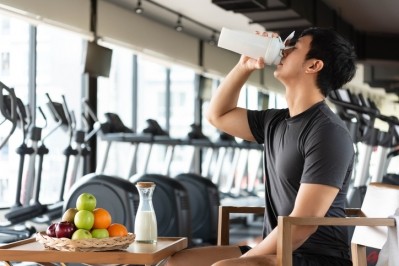Beyond immune support: Current trends in sports nutrition

“COVID-19 has been a big wild-card in 2020 with individuals being unable to know if they will be susceptible to it or be asymptomatic. Facing the unknown, consumers have made a large push towards taking better care of their health, especially in the immune health category,” said Rob Brewster, president of Ingredients by Nature.
Over the last few months, consumers have increasingly leaned on dietary supplements as they look for ways to support their immune health amid the coronavirus pandemic.
However, Mathias Toft Vangsøe, Health & Performance Nutrition Development Manager, Arla Foods Ingredients, told us that immune support was already a trend gaining traction pre-COVID. “Between 2015 and 2019, the global immunity market grew at a CAGR of +7%, and it was estimated to be worth $5 billion in 2020.”
And it continues to grow. “The immune vitamin and dietary supplement market has seen substantial growth, with US sales increasing by 25% in 2020, up from 8.5% in 2019,” said John Quilter, VP & General Manager of Kerry, the makers of Wellmune.
It’s no secret that immune supporting ingredients such as vitamins C,D, elderberry, zinc and others are flying off the shelves. But what other trends in sports nutrition have emerged?
Sub-sectors
The active lifestyle consumer is shifting the sports nutrition category in many different directions.
With the gut housing 70% of the cells that make up the immune system, it’s no wonder probiotics have popped up in sports nutrition supplements.
Sports nutritionist and probiotics expert Ralf Jäger said athletes have more diverse gut microbiota than those who do not exercise. “A person who goes to the gym and works out is twice as likely to take probiotics than a person who does not work out at all. So there’s an initial customer for probiotics for an athletic population.”
Athletic performance, inflammation, recovery, and immunity have all been linked to certain microbes, just a few reasons why developing areas for probiotic health in sports nutrition has taken off. Another area of interest is the prospect of mining elite athletes' microbiomes for potential probiotic strains.
A sub-sector that isn't going anywhere is active seniors. With the number of Americans age 65 and older projected to nearly double from 52 million in 2018 to 95 million by 2060, “Another long-term trend that will dominate the nutrition industry is population aging,” noted Vangsøe.
With that in mind, supplements positioned to support bone and joint health and prevent injury are expected to perform well. “We just launched Lacprodan HYDRO.Rebuild, a 100% hydrolyzed whey protein. It offers highly accessible content of all the essential amino acids and branched-chain amino acids such as leucine, which are important for optimal muscle synthesis and maintenance of muscle mass in seniors.”
One niche category that was thrusted into the spotlight during quarantine is eSports. “While COVID has created obstacles for the traditional sports nutrition, the esports category has flourished in innovation. Brands have been developing a wide variety of supplements to address the demands of the growing video gamer demographic for better energy, physical and cognitive performance, and even eye health. Our Eriomin line is a great example of how citrus flavonoids are able to address a broad spectrum of concerns from immune health to prediabetes management and can help support both traditional and esports,” noted Brewster.
Broadening nutrition verizons
While athletes and active adults participate in a variety of physical activities, many seek the same benefits: performance, recovery, and improved overall health. These common goals have shifted the category to a broader consumer base in sports nutrition.
“The sports nutrition industry in the beginning was very focused on athletes, the people that do high-level training,” observed Jonathan Jones, PhD, Research and Development Manager, Monteloeder. “Now, it's becoming a more mass market for more people who are your typical weekend warriors, who are taking sports supplements or are doing yoga or popular races and things like that. They’re looking for supplements to help improve their performance or their recovery. And then on the other side, sports nutrition itself is also diversifying. It was only mainly focused on proteins and now we're seeing other types of supplements, and that's something that we've been working on. We're always looking for new, innovative ingredients for sports performance and to not stay exclusive to the proteins.”
Indeed, the landscape appears to be shifting to include all types of physical activity. With decreasing attention paid to bodybuilding, there is a growing number of ‘casual consumers’ focused more on overall health.
Brewster said that with gyms closed for so long, the focus on weight lifting has shifted to endurance exercises such as running, hiking, and high intensity interval training (HIIT). “This means the industry’s sports nutrition solutions and messaging need to pivot as well. Yes, we need ingredients that enhance energy and performance, but we also need to realize that for many runners, hikers and more, the motivation is to maintain good overall health. Like with many other categories, holistic health is trending and I believe we will be seeing an increase in sports nutrition supplements that enhance the consumer’s efforts to improve their overall health in addition to performance. Moving in this direction, the sports nutrition category will also become more inclusive of a wider range of athletes or exercisers.”
Ultimately, health conscious consumers are becoming increasingly more aware of the benefits of exercise and supplementation and its impact on overall health.
While what trends will stick remains to be seen, Quilter said the validity of science is here to stay: “Consumers are increasingly hungry for facts about the products they buy. The crisis has further increased the importance of scientific substantiation.”
NutraIngredients-USA will host a webinar on July 8th called Sports Nutrition and COVID-19: Adapting, Navigating & Bracing for the Aftermath
The webinar will bring together several experts to reflect on how their respective areas of expertise have adapted to change in recent months and where they anticipate sports nutrition is headed.
You can register for free HERE.
















